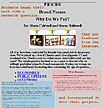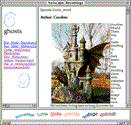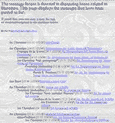| Daniel Anderson will focus on two implementations of Web teaching that try to fulfill discourse learning and collaborative goals | |
|---|---|
 One of the obvious advantages of
researching with discourse communities is that positions are tested as they
move through the group; the learning becomes dialectic. To capitalize on this
potential, I wanted to have students send a research query through an Internet
discourse forum. Students first worked through web-based assignments that
prompted them to refine a topic into a research query and then to post that query
to several newsgroups. The goal was to refine their thinking about the topic
through dialog and also to provide discourse based resources for the research
project. If you're interested in the process and the results, get more information about the student project. One of the obvious advantages of
researching with discourse communities is that positions are tested as they
move through the group; the learning becomes dialectic. To capitalize on this
potential, I wanted to have students send a research query through an Internet
discourse forum. Students first worked through web-based assignments that
prompted them to refine a topic into a research query and then to post that query
to several newsgroups. The goal was to refine their thinking about the topic
through dialog and also to provide discourse based resources for the research
project. If you're interested in the process and the results, get more information about the student project. |
 As part of a recent sophomore level writing class,
I've developed a set of cgi scripts that allow students to collaborate on a work of hyperfiction. The Becomings
project afforded our class with a number of opportunities to talk about the collaborative
nature of the Web and issues of hypertext and postmodern genres of communication. For instance,
as an early exercise, students browsed the Web looking for materials for their
story episodes. By gathering pieces which might be woven into their episodes,
students were able to use the Web as a collective grab bag. By using these materials and linking to
the episodes being
developed by other authors, students were able to
think about the benefits and drawbacks of creating this global and cooperative collage. As part of a recent sophomore level writing class,
I've developed a set of cgi scripts that allow students to collaborate on a work of hyperfiction. The Becomings
project afforded our class with a number of opportunities to talk about the collaborative
nature of the Web and issues of hypertext and postmodern genres of communication. For instance,
as an early exercise, students browsed the Web looking for materials for their
story episodes. By gathering pieces which might be woven into their episodes,
students were able to use the Web as a collective grab bag. By using these materials and linking to
the episodes being
developed by other authors, students were able to
think about the benefits and drawbacks of creating this global and cooperative collage.
|
| Joi Chevalier will focus on discourse learning through MU* spaces and the World Wide Web. | |
|---|---|
 Conveying cultural and social
constructs often proves difficult when discussing Early Modern Literature.
Demonstrating to students the relevance of not only historical information but
cultural and social traditions and structures can be complicated by the lack of
artifacts, material, and models for examination. In other words, it is difficult
for students to get a 'feel' for a society and time which would then underlie and
inform their reading of a text. As part of a continuing goal to provide methods
of using current computer technology to allow instructors to represent and model
the culture, even the very text, they are studying. This technology, Multi-User Shared Hallucinations (MUSH) or its counterpart,
Multi-Object Oriented Dimensions (MOO) are tools which can provide for Early
Modern Studies many issues which are essential for students to 'see' and
understand, but are difficult to truly represent. Conveying cultural and social
constructs often proves difficult when discussing Early Modern Literature.
Demonstrating to students the relevance of not only historical information but
cultural and social traditions and structures can be complicated by the lack of
artifacts, material, and models for examination. In other words, it is difficult
for students to get a 'feel' for a society and time which would then underlie and
inform their reading of a text. As part of a continuing goal to provide methods
of using current computer technology to allow instructors to represent and model
the culture, even the very text, they are studying. This technology, Multi-User Shared Hallucinations (MUSH) or its counterpart,
Multi-Object Oriented Dimensions (MOO) are tools which can provide for Early
Modern Studies many issues which are essential for students to 'see' and
understand, but are difficult to truly represent. |
 Once students have reestablished a
relationship with the text, then in depth critical analysis can begin. Here, the
World Wide Web becomes another environment for examining and evaluating
discourse learning. In self-generated discussions, students can, over time,
see connections between periods, authors, texts and complicated social
constructs, and also consider their own rhetoric and how they discussed those
issues. With Web message
forums and Interchanges
and posted roleplaying, students can perform self-analysis and
evaluation...discourse and metadiscourse, if you will. Once students have reestablished a
relationship with the text, then in depth critical analysis can begin. Here, the
World Wide Web becomes another environment for examining and evaluating
discourse learning. In self-generated discussions, students can, over time,
see connections between periods, authors, texts and complicated social
constructs, and also consider their own rhetoric and how they discussed those
issues. With Web message
forums and Interchanges
and posted roleplaying, students can perform self-analysis and
evaluation...discourse and metadiscourse, if you will. |